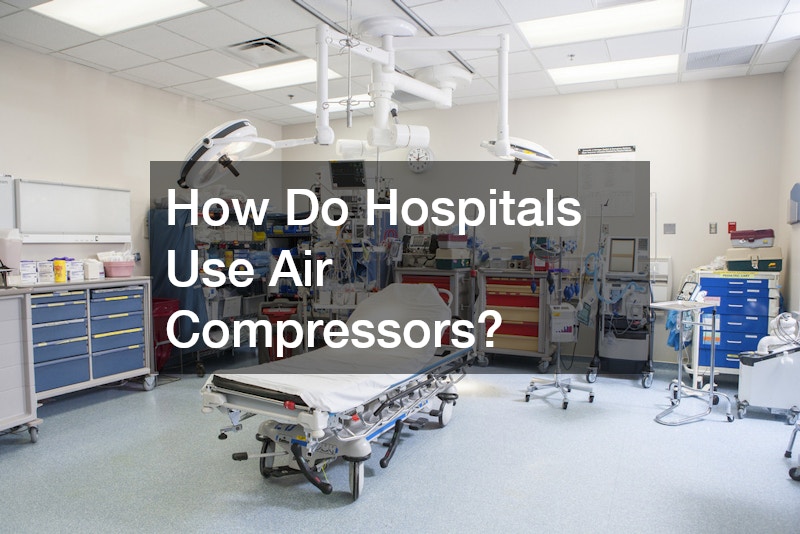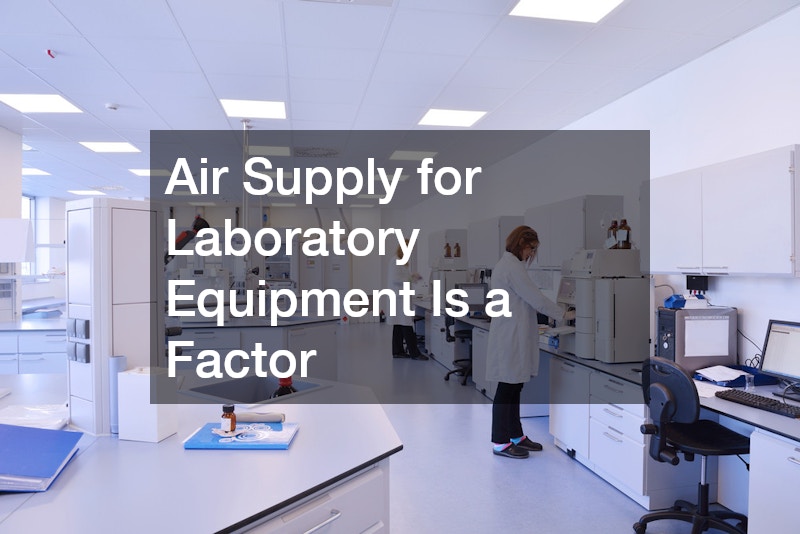

Air compressors are indispensable machines that have various applications across multiple industries, including the healthcare sector. In hospitals, air compressors serve as a critical component for maintaining patient care and supporting essential medical equipment. By providing a reliable and controlled source of compressed air, these systems ensure that hospital operations run smoothly and safely. From powering life-saving devices to facilitating everyday tasks, air compressors play a vital role in modern healthcare settings.
What Are Air Compressors?
Before delving into their use in hospitals, it’s important to understand what air compressors are and how they work. An air compressor is a mechanical device that converts power (often from electricity or gas) into potential energy stored in pressurized air.
The compressor draws in ambient air, compresses it, and then stores the air in a tank or directs it to be used immediately in various applications. The energy stored in compressed air can be used to power tools, equipment, and machinery by releasing it as needed.
Medical Air Supply Systems
One of the primary uses of air compressors in hospitals is to power the medical air supply systems. These systems provide clean, compressed air to various hospital devices and applications, which are crucial in patient care. Medical air, distinct from standard compressed air, must meet rigorous standards for purity and safety. It must be free of contaminants like oil, moisture, and particulate matter, as these could harm patients, particularly those in critical care.
Air compressors are used in centralized medical air systems that distribute compressed air to different departments within the hospital. These systems are essential for a wide variety of medical equipment, including ventilators, anesthesia machines, and breathing devices. These compressors ensure a consistent supply of clean air to keep patients breathing and receiving necessary medical treatments.
Ventilators and Respirators
Ventilators and respirators are life-saving machines that assist patients with breathing when they are unable to do so on their own. These devices are commonly used in intensive care units (ICUs), emergency rooms, and operating theaters. Many modern ventilators rely on compressed air to deliver the correct air pressure to the lungs. The air compressors provide the consistent airflow needed to support patients who are undergoing surgery, suffering from respiratory diseases, or recovering from severe injuries.
For instance, in an ICU setting, ventilators require compressed air to mix with oxygen to create the optimal gas mixture for patients. The air compressor ensures the air pressure is appropriate for delivering the air precisely to the lungs, making it a vital element for critical care. The use of medical-grade compressed air also minimizes the risk of infections and complications, as the system is continuously filtered and regulated.
Anesthesia Equipment
Anesthesia machines are another critical piece of equipment in hospitals that rely on air compressors. These machines are used during surgeries to administer anesthetic gases and control the patient’s breathing and sedation levels. Air compressors are responsible for delivering precise amounts of air mixed with anesthetic gases to maintain the desired level of sedation and oxygenation.
The compressed air in anesthesia machines must be of high purity to ensure patient safety. If the air is contaminated with impurities, it could potentially cause severe reactions, such as respiratory distress or infection. Hospitals rely on air compressors to maintain the purity and consistency of the air supplied to anesthesia machines, making them indispensable for safe surgical procedures.
Pneumatic Tubing Systems
Another common application of air compressors in hospitals is within pneumatic tubing systems. These systems are used to transport medical supplies, samples, and medications efficiently throughout a hospital. Air compressors provide the necessary pressure to move items through tubes to designated locations, such as from the pharmacy to the patient’s room or from the laboratory to the testing area.
Pneumatic tube systems are commonly found in large hospitals with multiple floors and departments. They allow staff to quickly and securely send important items without needing to manually transport them, which can save time and reduce the potential for errors. The air compressor’s role in these systems ensures the rapid and reliable movement of goods, which is crucial in a healthcare setting where time is often of the essence.
Cleaning and Sterilization
Hospitals also use compressed air for cleaning and sterilization purposes. High-pressure compressed air is used in cleaning medical equipment, instruments, and surfaces. It can blow off dust, debris, or other contaminants that may be present on equipment before they are sterilized. This is particularly important in environments such as operating rooms, where sterility is essential to prevent infections.
In addition to medical instruments, compressed air is also used to power cleaning tools that help maintain hospital hygiene. For example, air-powered scrubbers or blowers are used to clean floors, walls, and ventilation systems. Ensuring that hospital surfaces are free from contaminants helps reduce the risk of hospital-acquired infections (HAIs), a significant concern in healthcare settings.
Air Supply for Laboratory Equipment
Hospitals often have in-house laboratories for conducting tests and analysis. Laboratory equipment such as blood analyzers, centrifuges, and diagnostic machines often rely on compressed air to operate. The use of compressed air helps in creating a consistent and controlled environment for lab instruments that need specific pressure and airflow to function correctly.
For example, centrifuges used in laboratories often require compressed air to operate their mechanical systems. The air helps move the centrifuge’s rotors and allows samples to be processed efficiently. Similarly, medical gas delivery systems and other diagnostic equipment in hospitals depend on air compressors to provide consistent, reliable airflow that is crucial for accurate results.
Watch the video above to learn more about medical air compressor solutions!
.

